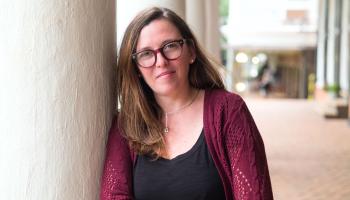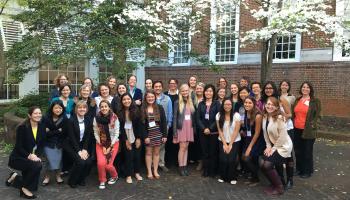Department of Economics Hosts Visit by Federal Reserve Gov. Lisa Cook
University of Virginia students interested in understanding the latest forecasts on inflation, the U.S. labor market and other economic trends enjoyed a unique opportunity to hear directly from a member of the federal body studying those issues and writing policies that aim to ensure a financially sound banking system and a stable domestic economy.
During a Nov. 20 visit hosted by the Department of Economics, Federal Reserve Governor Lisa Cook discussed the “significant progress” being made on disinflation, the current state of the U.S. job market and the potential of advancements in artificial intelligence technology to transform many aspects of the economy in a public talk held in the Dome Room of UVA’s Rotunda.
In her prepared remarks, Cook said that while there has been a decrease in the rate of inflation, but elevated core inflation — which do not include changes in the costs of food and energy — “suggests that we have further to go before credibly achieving our inflation target of 2%.”
Cook also described the jobs landscape as solid, a reassuring note for students in the audience considering their postgraduation plans.
“The labor market is in a good position — with the supply and demand for workers being roughly in balance — such that it is no longer a source of inflationary pressure in the economy,” Cook said, adding that the Fed’s decisions are guided by the dual mandate of enacting policies supporting maximum employment and stable prices.
She added that downside risks to employment have “diminished somewhat” recently. Still, she said, national job growth is “perhaps not quite strong enough to keep unemployment at the current low rate.” Cook also noted that if the labor market and inflation continue to progress in line with her forecasts, it could be appropriate to lower rates “over time until we near the neutral rate of interest.”
A former Michigan State University professor of economics and international relations and a senior economist on the Council of Economic Advisers under President Barack Obama,
Cook is the first Black woman to serve on the Federal Reserve Board. Her visit to Grounds also included lunch with Department of Economics graduate students and a meeting with the undergraduate Women in Economics club.
Following her prepared remarks on the economy, Cook fielded questions in the Rotunda’s Dome Room from Christa Acampora, Dean of the College and Graduate School of Arts & Sciences, and Natasha Swindle, a fourth-year Echols Scholar pursuing majors in economics and the College’s Political Philosophy, Policy and Law program.
Voicing a question submitted by students about the current job market, Acampora asked Cook about the difference between what had been an overheated job market and the Fed’s goal of maximal employment.
“To be clear, before the pandemic, the labor market was tight by historical standards. We’re getting to that place of normalizing,” Cook explained. “Now, when the market is overheated and there is intense competition for jobs and people are switching jobs a lot, this contributes to inflationary pressure. What we're trying to do is to make sure that inflation is going toward our target, and that’s what we’ve seen without significant declines in employment. ... We see layoffs, but we don't see massive layoffs, so this is a good place for the economy to be. That’s the difference between overheated and maximum employment. Maximum employment is what would be the unemployment rate if that [rate] would not increase inflation. and that's what we would prefer to see.”
Swindle followed up by asking Cook to discuss further how the Fed balances its dual mandate role of promoting employment and attempting to control inflation.
"One thing that I’ve always said since I became a governor is that we as policymakers have to be humble, nimble and data dependent,” Cook said. “We have to be humble about the data, because we don't know if the data are sending signals that are still left over from the pandemic. We have to be very careful about how we are proceeding, so we have to be nimble, and we have to be able to move when the data says we should. We have to be data dependent. We have to actually look at the data and interpret the data as best we can.”
Asked what advice she had for any aspiring economists in the audience looking to make an impact in their research and communities, Cook encouraged everyone to familiarize themselves with the artificial intelligence tools increasingly being used throughout the economy. Cook said she first took an individual course on AI tools seven years ago to understand the potential economic boon AI could be, and as director of the American Economic Association’s Summer Training Program, which aims to increase diversity in the field of economics by preparing talented undergraduates for doctoral programs, she incorporated AI training in its courses .
“What you want to do is give everyone a fair chance, and [what constitutes] a fair chance was moving very quickly,” Cook said about the rapid advancements in AI technology and its economic impact. “So, I think that all students, whether they are thinking about going straight to a job or doing a Ph.D. in economics, I think the time to embrace AI is now. The time to experiment with it in a safe place where you can be guided is now, and it is here.”







